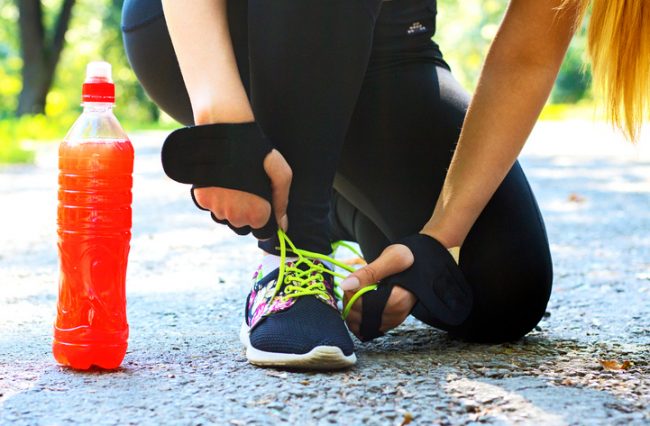To be sure, energy drinks give you a buzz. Yet there’s a buzzkill here: Gulping an energy drink can harm your health.
One byproduct of the potentially ill effects: Between 2007 and 2011, the number of ER visits related to energy drinks more than doubled in the U.S., according to the National Center for Complementary and Integrative Health. People 40 and older experienced the biggest spike in ER visits tied to energy drinks (279 percent), the center says.
Even more troubling is that from 2004 to 2012, nearly three dozen deaths in the U.S. were connected to energy drinks, according to a Center for Science in the Public Interest report from 2014. The center was quick to point out that evidence hadn’t shown whether energy drinks actually caused the deaths.
Here are just five of the potentially life-altering problems associated with downing sports drinks.
1. Caffeine overload.
Of course, people buy energy drinks to get a lift from ingredients like caffeine. But this can be way too much of a good thing.
The National Center for Complementary and Integrative Health says a 24-ounce energy drink might contain as much as 500 milligrams of caffeine — equivalent to what you’d find in four or five cups of coffee. The drinks, marketed as improving mental and physical performance, are sold under brand names like Monster, Red Bull and Rockstar.
As noted by Consumer Reports, caffeine can boost your alertness, mood, mental aptitude and physical performance, but it also can make you jittery, trigger sleeplessness, prompt abnormal heart activity and raise blood pressure.
As such, a healthy adult should consume up to 400 milligrams of caffeine per day, Consumer Reports says, with a pregnant woman limited to 200 milligrams and a child restricted to 45 to 85 milligrams, depending on the child’s weight.
In light of that information, Dr. Morton Tavel, clinical professor emeritus of Medicine at Indiana University’s School of Medicine, recommends dumping energy drinks altogether and sticking to coffee if you’re in search of a caffeine jolt.
Keep in mind that a lot of energy drinks don’t disclose caffeine content on their labels. The Center for Science in the Public Interest, a food and nutrition watchdog, has proposed requiring makers of energy drinks to cap caffeine content at 71 milligrams per 12 ounces — the maximum amount that the FDA considers safe in cola-type beverages.
2. Questionable additives.
Dan Mark, research director at Labdoor, a startup that tests and ranks vitamins and supplements, warns that energy drinks contain stuff you might not want in your body. This includes artificial sweeteners like sucralose and various coloring agents, both of which have been linked to health problems.
If an energy drink is billed as “low sugar” or “no sugar,” chances are it’s made with artificial sweeteners, says registered dietitian Rene Ficek, a nutrition expert at meal delivery service Seattle Sutton’s Healthy Eating. “So while excessive sugar is bad for our health, the alternative isn’t a very healthy choice either,” she says.
If you’re craving a sweet beverage of any kind, look for a sports drink that contains a small amount of real sugar, honey or agave nectar, Ficek says.
3. Sugar rush.
In a 2015 survey, Action on Sugar, a British nonprofit that informs consumers about the harmful effects of sugar, found that a roughly 16-ounce energy drink packs as much as 78 grams, or 20 teaspoons, of sugar.
As you might imagine, that’s well above the recommended intake of sugar for an entire day. Guidelines from the American Heart Association indicate a man should consume no more than 36 grams of added sugar a day; for a woman, the threshold is 24 grams.
Aside from the most obvious risks posed by too much sugar — weight gain, diabetes and cavities — a study published in 2014 in JAMA Internal Medicine found that a sugar-laden diet can bump up your chances of dying from heart disease.
“If you’re going to have something sweet, have a fruit-based dessert. That way, at least you’re getting something good out of it,” says Teresa Fung, adjunct professor of nutrition at the Harvard School of Public Health.
4. Suspicious ingredients.
Experts say too little is known about the health effects of chemical and herbal ingredients in energy drinks such as guarana (which contains caffeine), taurine, glucuronolactone, carnitine, ginseng, ginkgo biloba and milk thistle extract. In particular, the Center for Science in the Public Interest has raised concerns about how these ingredients interact with caffeine.
As noted by nutrition experts at the University of California, Davis, sufficient scientific evidence is lacking to support the touted benefits of these ingredients.
5. Loose labeling.
Although they’re called “drinks,” many energy drinks are labeled as “dietary supplements” rather than “beverages,” according to the University of Maryland law school. Unlike beverages, active ingredients in dietary supplements don’t require approval from the U.S. Food and Drug Administration (FDA), the law school says. Plus, the FDA must prove that an ingredient in a dietary supplement is unsafe before a product can be yanked from the market.
In 2014, the Center for Science in the Public Interest called on the FDA to mandate warning labels on energy drinks to alert consumers about potential health risks.
In their defense, makers of energy drinks insist that their products are safe, and that they voluntarily exceed federal standards for labeling and marketing.
“The safety of energy drinks has been established by scientific research as well as regulatory agencies around the globe,” the American Beverage Association, a trade group, said in a 2015 statement to Time magazine. “Just this year the European Food Safety Authority (EFSA) confirmed the safety of energy drinks and their ingredients after an extensive review.”

